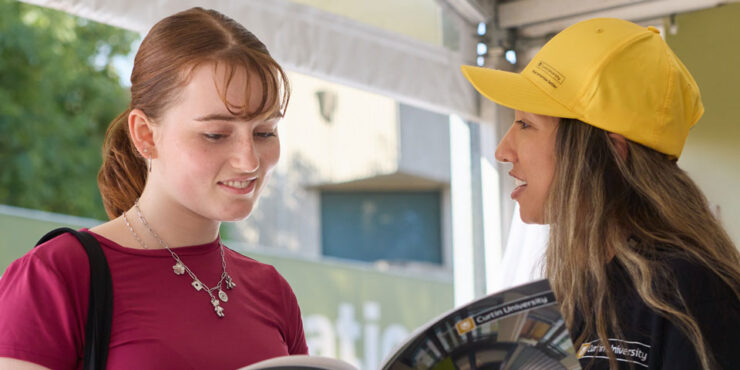Course overview
This course will give you expertise in various areas of communication. You will study subjects in media, design and business, and gain foundational knowledge in corporate communications.
You’ll develop critical thinking skills and use commercial-level equipment to create content for print, radio, film, television and online media.
To build your degree, you'll choose two specialisations to study from our media, and design and communications options.
You’ll graduate with the training and professional skills for traditional and emerging media and communication careers.
Career outcomes
Careers
- Content creator
- Public relations/media liaison specialist
- Marketing/advertising consultant
- Media and communications consultant
- Web developer/manager
- Filmmaker
- Photographer
- Public relations officer
Industries
- Media
- Marketing
- Public relations
- Advertising
- Film and television
- Radio broadcasting
Why study at Curtin?
Specialist pathways
This course culminates in a capstone unit, where you’ll get to work on an applied project relevant to your chosen specialisations.
Get the Curtin edge
You'll build a portfolio of work, meet industry professionals, use commercial-level communications software and facilities, including our media production and photography studios.
Broad career options
Our Communications course gives you flexibility with your degree, with a choice of two specialisations from eight areas.
Your student experience

Work-integrated learning at Curtin: explore a Universe of opportunity
Develop real-world experience before you graduate. Learn how work-integrated learning helps you build career skills and connect with industry early.

Thinking about uni? Five reasons Curtin could be your best move
Not sure if uni is for you? Explore five clear reasons students choose Curtin – from flexible pathways and support to real-world skills and outcomes.

Find your entry pathway to Curtin
You may be finishing high school, coming from TAFE, or just thinking of a career change; but whatever your background, there’s an entry pathway to Curtin for you.
Upcoming events

29 March 2026
Curtin Open Day
Curtin Perth
Discover where in the world a Curtin Degree can take you at Curtin Open Day. Explore courses that connect with industry, meet people who can guide your career direction and see how your ideas can become a reality.
Course structure
What you’ll learn
In your first year you’ll be introduced to the different spokes of communications and study optional units that reflect or refine your learning in specific communication areas.
In your second and third years you’ll choose two specialisations to study: one media specialisation and one design and communications specialisation, or two media specialisations.
Throughout your studies, you’ll build a portfolio of work and have opportunities to meet industry professionals.
Customise your degree
Tailor your course by choosing your Media specialisation. Then complement it with a second specialisation from Design or Communications, or another media specialisation.
Step 1: Choose your Media specialisation
Choose from:
Step 2: Choose your second specialisation
Detailed course structure and unit information
For detailed information and course structure, visit our Handbook.
Entry requirements
To study this course, you must meet the entry criteria:
- course ATAR, or equivalent, demonstrated via an accepted entry pathway
- any course-specific requirements
- English language requirement.
Guaranteed entry
If you achieve the guaranteed ATAR/selection rank for this course and meet all other entry requirements, you’re guaranteed a place in this course.
Entry pathways
There are different ways to meet our academic entry requirements. Choose the option that best suits the highest level of education that you’ve achieved.
Curious how students entered this course? See the entry pathways other students have taken.
Course-specific requirements
You’ll also need to meet any specific requirements to be eligible to apply for this course.
Study credit and support
You may be able to receive study credit or support based on your previous experience or personal circumstances.
Get credit towards your degree
You may be able to receive credit for recognised learning (CRL) from past study or professional experience, which could reduce the time it takes to finish your course.
Find specific details about CRL for this course on the Handbook.
Special consideration
If your studies were affected by circumstances beyond your control, you may be eligible for special consideration when applying to Curtin. This process is available to new applicants only and allows your application to be assessed in light of those circumstances.
Additional information
Notes about this course
Make sure you check the course notes for any other important information.
Fees
2026 Domestic indicative fees
*The indicative first-year fee is based on a standard full-time study load of 200 credit points.
This fee is a guide only. Your total fee may vary depending on the units you choose, your study load or if your course includes additional requirements. For more information on fees, see other fees and charges.
Scholarships
Get the support you need to succeed with our diverse range of scholarships. Whether it’s financial support, assistance with relocation, or recognition for your academic achievements, we have scholarships tailored to your unique needs.
How to apply
Follow these steps to make sure you’re eligible, prepared and ready to apply for your course.
Check entry requirements
Entry requirements differ by course and your previous work and study experience.
Prepare your documents
The documents you need may vary depending on your course and application pathway.
Check application deadlines
Deadlines vary by course and whether you’re applying as a domestic or international student.
Choose your application pathway
I’m in year 12 or applying for Medicine
If you’re in year 12 or recently finished high school, you’ll need to apply through TISC.
You’ll apply through TISC no matter what you studied in high school, whether that was:
- ATAR
- General subjects
- Certificate IV
- or completing UniReady in Schools program.
TISC has different application dates to Curtin. Visit the TISC website for all important dates, including application deadlines.
I have finished high school
If you’re not a current year 12 student or recent graduate, you’re considered a non school leaver and you’ll apply directly to Curtin.
The only exception is Medicine, which must be applied for through TISC.
You’ll apply directly to Curtin if you are:
- a high school graduate who finished school last year or earlier
- transferring from another university
- returning to study or using your professional experience to qualify
- progressing from a VET or TAFE qualification or bridging program
- a current Curtin student changing courses or campuses.
Application deadlines can vary by course. Make sure to check application deadlines before you apply.
Express your interestExplore more
Find more resources to help you take the next step in your Curtin journey.